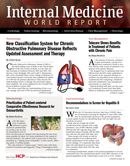Publication
Article
Internal Medicine World Report
Addressing Behavior Concerns in Adolescents with Omega-3 Supplements
Author(s):
Omega-3 supplementation can help reduce behavioral issues in adolescents who may be particularly prone to oxytocin receptor gene methylation.

Callous-unemotional children are susceptible to oxytocin receptor gene methylation, though behavior issues can be addressed via omega-3 supplementation, according to 2 studies published in Molecular Psychiatry and the Journal of Child Psychology and Psychiatry, respectively.
The first paper, titled “Environmental risk, Oxytocin Receptor Gene (OXTR) methylation and youth callous-unemotional traits,” was conducted by a multidisciplinary team of researchers from Philadelphia, Pennsylvania and England, United Kingdom who studied 14,541 children born between April 1991 and December 1992, who were enrolled in the Avon Longitudinal Study of Parents and Children (ALSPAC). The 339 children enrolled in the subset of the ALSPAC group were 50% female and were analyzed for levels of anxiety and depression, pre- and post-natal environmental risk factors, and epigenetic changes to the oxytocin receptor gene at birth, and at ages 7 and 9 years.
The researchers found that the 84 eligible patients were split into 2 groups, low internalizing (INT—) and high internalizing (INT+). The data showed levels did not differ in callous-unemotional (CU) traits such as lack of guilt and empathy levels. The INT– group demonstrated lower levels of cumulative environmental risk, when compared to their INT+ counterparts. The data also showed correlations among environmental risk, CU, and OXTR methylation were positive across INT– and INT+, and OXTR methylation at birth was correlated with higher CU in INT– patients.
“We found that children with low levels of anxiety/depression were, in fact, born with higher levels of DNA methylation in the OXTR, which may contribute to callousness, and discourage victimization by peers,” the study’s senior author Edward Barker, PhD, told HealthCanal. “On the other hand, youth who display high levels of anxiety/depression and callousness may do so in response to prenatal social adversity which may independently be linked to callousness. Addressing the prenatal environment for high-risk mothers may be effective in reducing CU traits in children, either by reduced methylation, or directly by reducing family risks factors, such as maternal depression, anxiety, substance use, that can negatively affect child development both during pregnancy and after birth.”
In the second study, titled “Reduction in behavior problems with omega-3 supplementation in children aged 8—16 years,” researchers from the University of Pennsylvania studied 100 patients aged 8-16 years, alongside 100 control patients. The patients were evaluated for 12 months measuring omega-3 supplementation via 1 g/day of fruit drink with and without the supplement.
“We had previously shown that young children with poor nutrition are antisocial as teenagers,” said Adrian Raine, PhD, corresponding author of the University of Pennsylvania study, in an E-mail to Internal Medicine World Report. “We reasoned that improving nutrition may help improve behavior — and omega-3 has been shown to be a promising supplement in other studies on adults.”
The researchers noted that the behavioral improvement within the children still continued 6 months after cessation of the omega-3 treatment. The researchers were surprised to conclude that not only did the children who took omega-3 supplements show improved behavior, but a significant change was also noted in their parents.
“It may well be that when the child’s behavior improved with the omega-3 drink that resulted in less stress for the parent, resulting in behavioral improvement in the parents,” Raine continued.
“Omega-3 could be helpful for children and teenagers who are antisocial, anxious, or depressed.”




